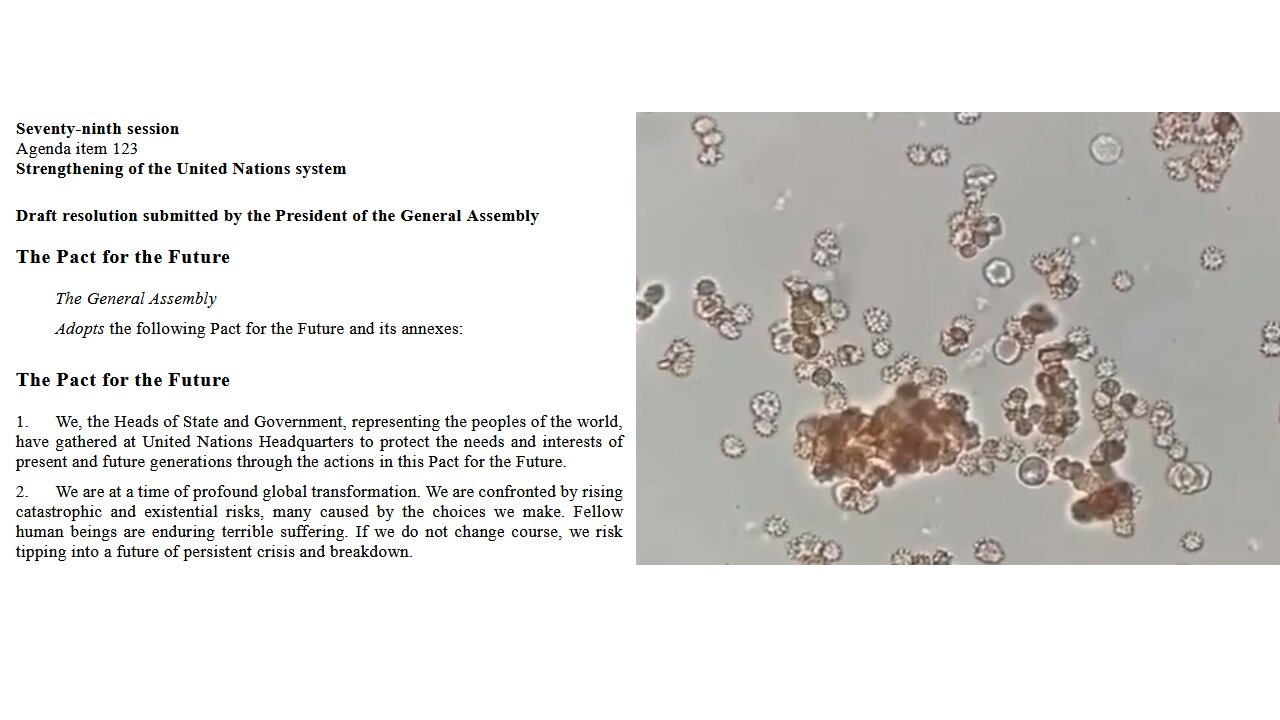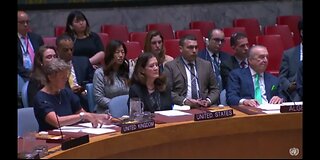Premium Only Content

Results of 6 Covid Vaccines added to unvaxxed blood sample UN PACT FOR THE FUTURE
Results of 6 Covid Vaccines added to unvaxxed blood sample UN PACT FOR THE FUTURE
https://documents.un.org/doc/undoc/ltd/n24/252/89/pdf/n2425289.pdf
United Nations A/79/L.2
General Assembly Distr.: Limited
20 September 2024
Original: English
24-15616 (E) 210924
*2415616*
Seventy-ninth session
Agenda item 123
Strengthening of the United Nations system
Draft resolution submitted by the President of the General Assembly
The Pact for the Future
The General Assembly
Adopts the following Pact for the Future and its annexes:
The Pact for the Future
1. We, the Heads of State and Government, representing the peoples of the world,
have gathered at United Nations Headquarters to protect the needs and interests of
present and future generations through the actions in this Pact for the Future.
2. We are at a time of profound global transformation. We are confronted by rising
catastrophic and existential risks, many caused by the choices we make. Fellow
human beings are enduring terrible suffering. If we do not change course, we risk
tipping into a future of persistent crisis and breakdown.
3. Yet this is also a moment of hope and opportunity. Global transformation is a
chance for renewal and progress grounded in our common humanity. Advances in
knowledge, science, technology and innovation could deliver a breakthrough to a
better and more sustainable future for all. The choice is ours.
4. We believe that there is a path to a brighter future for all of humanity, including
those living in poverty and vulnerable situations. Through the actions we take today,
we resolve to set ourselves on that path, striving for a world that is safe, peacef ul,
just, equal, inclusive, sustainable and prosperous, a world in which well -being,
security and dignity and a healthy planet are assured for all humanity.
5. This will require a recommitment to international cooperation based on respect
for international law, without which we can neither manage the risks nor seize the
opportunities that we face. This is not an option but a necessity. Our challenges are
deeply interconnected and far exceed the capacity of any single State alone. They can
only be addressed collectively, through strong and sustained international cooperation
guided by trust and solidarity for the benefit of all and harnessing the power of those
who can contribute from all sectors and generations.
A/79/L.2
24-156162/56
6. We recognize that the multilateral system and its institutions, with the United
Nations and its Charter at the centre, must be strengthened to keep pace with a
changing world. They must be fit for the present and the future – effective and
capable, prepared for the future, just, democratic, equitable and representative of
today’s world, inclusive, interconnected and financially stable.
7. Today, we pledge a new beginning in multilateralism. The actions in this Pact
aim to ensure that the United Nations and other key multilateral institutions can
deliver a better future for people and planet, enabling us to fulfil our existing
commitments while rising to new and emerging challenges and opportunities.
8. We reaffirm our unwavering commitment to act in accordance with international
law, including the Charter of the United Nations and its purposes and principles.
9. We also reaffirm that the three pillars of the United Nations – sustainable
development, peace and security, and human rights – are equally important,
interlinked and mutually reinforcing. We cannot have one without the others.
10. We recognize that sustainable development in all its three dimensions is a
central goal in itself and that its achievement, leaving no one behind, is and always
will be a central objective of multilateralism. We reaffirm our enduring commitment
to the 2030 Agenda for Sustainable Development1 and its Sustainable Development
Goals. We will urgently accelerate progress towards achieving the Goals, including
through concrete political steps and mobilizing significant additional financing from
all sources for sustainable development, with special attention to the needs of those
in special situations and creating opportunities for young people. Poverty in all its
forms and dimensions, including extreme poverty, remains the greatest global
challenge and its eradication is an indispensable requirement for sustainable
development.
11. Climate change is one of the greatest challenges of our time, with adverse
impacts that are disproportionately felt by developing countries, especially those that
are particularly vulnerable to the adverse effects of climate change. We commit to
accelerate meeting our obligations under the United Nations Framework Convention
on Climate Change2 and the Paris Agreement.3
12. To live up to our foundational promise to protect succeeding generations from
the scourge of war, we must abide by international law, including the Charter, and
make full use of all the instruments and mechanisms set out in the Charter,
intensifying our use of diplomacy, committing to resolve our disputes peacefully,
refraining from the threat or use of force, or acts of aggression, respecting each other’s
sovereignty and territorial integrity, upholding the principles of political
independence and self-determination, as well as strengthening accountability and
ending impunity. With challenges and risks to international peace and security taking
on more dangerous forms, in traditional and new domains, our efforts must keep pace.
13. Every commitment in this Pact is fully consistent and aligned with international
law, including human rights law. We reaffirm the Universal Declaration of Human
Rights4 and the fundamental freedoms enshrined therein. The implementation of the
Pact will enhance the full enjoyment of human rights and dignity for all, which is a
key goal. We will respect, protect, promote and fulfil all human rights, recognizing
their universality, indivisibility, interdependence and interrelatedness, and we will be
__________________
1 Resolution 70/1.
2 United Nations, Treaty Series, vol. 1771, No. 30822.
3 Adopted under the UNFCCC in FCCC/CP/2015/10/Add.1, decision 1/CP.21.
4 Resolution 217 A (III).
A/79/L.2
3/5624-15616
unequivocal in what we stand for and uphold: freedom from fear and freedom from
want for all.
14. We recognize that our efforts to redress injustice and to reduce inequalities
within and between countries to build peaceful, just and inclusive societies cannot
succeed unless we step up our efforts to promote tolerance, embrace diversity and
combat all forms of discrimination, including racism, racial discrimination,
xenophobia and related intolerance and all their abhorrent and contemporary forms
and manifestations.
15. None of our goals can be achieved without the full, safe, equal and meaningful
participation and representation of all women in political and economic life. We
reaffirm our commitment to the Beijing Declaration and Platform for Action, 5 to
accelerating our efforts to achieve gender equality, women’s participation and the
empowerment of all women and girls in all domains and to eliminating all forms of
discrimination and violence against women and girls.
16. We reaffirm our pledge, made on the occasion of the seventy-fifth anniversary
of the United Nations, to reinvigorate global action to ensure the future we want and
to effectively respond to current and future challenges, in partnership with all relevan t
stakeholders. We recognize that the well-being of current and future generations and
the sustainability of our planet rests on our willingness to take action. To that end, in
this Pact we commit to 56 actions in the areas of sustainable development and
financing for development, international peace and security, science, technology and
innovation and digital cooperation, youth and future generations, and transforming
global governance.
17. We will advance implementation of these actions through relevant, mandated
intergovernmental processes, where they exist. We will review the overall
implementation of the Pact at the beginning of the eighty-third session of the General
Assembly through a meeting at the level of Heads of State and Government. We are
confident that, by then, we will be well on course towards the better and more
sustainable future we want for ourselves, our children and all the generations who
will come after us.
I. Sustainable development and financing for development
18. In 2015, we resolved to free the human race from the tyranny of poverty, hunger
and want and to heal and secure our planet. We promised that we would leave no one
behind. We have made some progress, but the achievement of the Sustainable
Development Goals is in peril. Progress on most of the Goals is either moving too
slowly or has regressed below the 2015 baseline. Years of sustainable development
gains are being reversed. Poverty, hunger and inequality have increased. Human
rights are under threat, and we run the risk of leaving millions of people behind.
Climate change, biodiversity loss, desertification and sand and dust storms, pollution
and other environmental challenges pose serious risks to our natural environment and
our prospects for development.
19. We will not accept a future in which dignity and opportunity are denied to half
the world’s population or become the sole preserve of those with privilege and wealth.
We reaffirm that the 2030 Agenda for Sustainable Development is our overarching
road map for achieving sustainable development in all three of its dimensions,
overcoming the multiple, interlinked crises that we face and securing a better future
for present and future generations. We recognize that eradicating poverty in all its
forms and dimensions, including extreme poverty, is the greatest global challenge and
__________________
5 Report of the Fourth World Conference on Women, Beijing, 4 –15 September 1995 (United
Nations publication, Sales No. E.96.IV.13), chap. I, resolution 1, annexes I and II.
A/79/L.2
24-156164/56
an indispensable requirement for sustainable development. Sustainable development
and the realization of human rights and fundamental freedoms are interdependent and
mutually reinforcing. We reaffirm that gender equality and the empowerment of all
women and girls is an essential prerequisite for sustainable development. We cannot
achieve our shared ambitions for the future without addressing these challenges with
urgency and renewed vigour. We are committed to ensuring that the multilateral
system can turbocharge our aspirations to deliver for people and planet, and we will
place people at the centre of all our actions.
Action 1. We will take bold, ambitious, accelerated, just and transformative
actions to implement the 2030 Agenda, achieve the Sustainable Development
Goals and leave no one behind.
20. We reaffirm that the Sustainable Development Goals are a comprehensive, far-
reaching and people-centred set of universal transformative Goals and targets. We
reiterate our steadfast commitment to achieve the Sustainable Development Goals by
2030 and revitalize the global partnership for sustainable development, working
closely with all relevant stakeholders. We recognize that the 2030 Agenda is universal
and that all developing countries, including countries in special situations, in
particular African countries, least developed countries, landlocked developing
countries and small island developing States, as well as those with specific
challenges, including middle-income countries and countries in conflict and post-
conflict situations, require assistance to implement the Agenda. We will strengthen
our actions to address climate change. We reaffirm the principles of the Rio
Declaration on Environment and Development,6 including the principle of common
but differentiated responsibilities as set out in principle 7 thereof . We decide to:
(a) Scale up our efforts towards the full implementation of 2030 Agenda for
Sustainable Development, the Addis Ababa Action Agenda7 and the Paris Agreement;
(b) Fully implement the commitments in the political declaration agreed at the
Sustainable Development Goals Summit in 2023;8
(c) Mobilize significant and adequate resources and investments from all
sources for sustainable development;
(d) Remove all obstacles to sustainable development and refrain from
economic coercion.
Action 2. We will place the eradication of poverty at the centre of our efforts to
achieve the 2030 Agenda.
21. Eradicating poverty, in all its forms and dimensions, including extreme poverty,
is an imperative for all humankind. We decide to:
(a) Take comprehensive and targeted measures to eradicate poverty by
addressing the multidimensional nature of poverty, including through rural
development strategies and investments and innovations in the social sector,
especially education and health;
(b) Take concrete actions to prevent people from falling back into poverty,
including by establishing well-designed, sustainable and efficient social protection
systems for all that are responsive to shocks.
__________________
6 Report of the United Nations Conference on Environment and Development, Rio de Janeiro,
3– 14 June 1992, vol. I, Resolutions Adopted by the Conference (United Nations publication,
Sales No. E.93.I.8 and corrigendum), resolution 1, annex I.
7 Resolution 69/313, annex.
8 Resolution 78/1, annex.
A/79/L.2
5/5624-15616
Action 3. We will end hunger and eliminate food insecurity and all forms of
malnutrition.
22. We remain deeply concerned that one third of the world’s population remains
food-insecure, and we will respond to and tackle the drivers of food insecurity and
malnutrition. We decide to:
(a) Support countries and communities affected by food insecurity and all
forms of malnutrition through coordinated action, including through the provision of
emergency food supplies, programmes, financing, support to agricultural production,
by building national resilience to shocks and by ensuring that food and agriculture
supply chains function, and markets and trade channels remain free and accessible;
(b) Assist countries in debt distress to manage volatility in international food
markets and work in partnership with international financial institutions and the
United Nations system to support developing countries affected by food insecurity;
(c) Promote equitable, resilient, inclusive and sustainable agrifood systems so
that everyone has access to safe, affordable, sufficient and nutritious food.
Action 4. We will close the Sustainable Development Goal financing gap in
developing countries.
23. We are deeply concerned by the growing Sustainable Development Goal
financing gap facing developing countries. We must close this gap to prevent a lasting
sustainable development divide, widening inequality within and between countries
and a further erosion of trust in international relations and the multilateral system. We
note ongoing efforts to address the financing gap, including through the Secretary -
General’s proposal for a Sustainable Development Goal stimulus. We decide to:
(a) Provide and mobilize sustainable, affordable, accessible, transparent and
predictable development finance from all sources and the required means of
implementation to developing countries;
(b) Continue to advance with urgency towards a Sustainable Development
Goal stimulus through the Secretary-General’s proposal at the United Nations and in
other relevant forums;
(c) Scale up and fulfil our respective official development assistance
commitments, including the commitment by most developed countries to reach the
goal of 0.7 per cent of gross national income for official development assistance and
0.15 to 0.20 per cent of gross national income for official development assistance to
least developed countries;
(d) Continue discussions on the modernization of measurements of official
development assistance, while adhering to existing commitments;
(e) Ensure that development assistance is focused on and reaches developing
countries, focused in particular on the poorest and most vulnerable, and take further
actions to strengthen its effectiveness;
(f) Create a more enabling environment at the global, regional and national
levels to increase the mobilization of domestic resources and enhance the capacities,
institutions and systems of developing countries at all levels to achieve this goal,
including through international support, to increase investment in sustainable
development;
(g) Implement effective economic, social and environmental policies and
ensure good governance and transparent institutions to advance sustainable
development;
A/79/L.2
24-156166/56
(h) Strengthen ongoing efforts to prevent and combat illicit financial flows,
corruption, money-laundering and tax evasion, eliminate safe havens and recover and
return assets derived from illicit activities;
(i) Promote inclusive and effective international tax cooperation, which
contributes significantly to national efforts to achieve the Sustainable Development
Goals, as it enables countries to effectively mobilize their domestic resources, and
stress that the current international tax governance structures need improvements. We
are committed to strengthening the inclusiveness and effectiveness of tax cooperation
at the United Nations, while taking into consideration the work of other relevant
forums and institutions, and will continue to engage constructively in the process
towards developing a United Nations framework convention on international tax
cooperation;
(j) Explore options for international cooperation on the taxation of high-net-
worth individuals in the appropriate forums;
(k) Support developing countries to catalyse increased private sector
investment in sustainable development, including by promoting inclusive and
innovative finance mechanisms and partnerships and by creating a more enabling
domestic and international regulatory and investment environment, and through the
catalytic use of public financing;
(l) Scale up support from all sources for investment in increasing productive
capacities, inclusive and sustainable industrialization, infrastructure and structural
economic transformation, diversification and growth in developing countries;
(m) Secure an ambitious outcome at the Fourth International Conference on
Financing for Development in 2025 to close the Sustainable Development Goal
financing gap and accelerate the implementation of the 2030 Agenda and the
achievement of the Sustainable Development Goals.
Action 5. We will ensure that the multilateral trading system continues to be an
engine for sustainable development.
24. We are committed to a rules-based, non-discriminatory, open, fair, inclusive,
equitable and transparent multilateral trading system, with the World Trade
Organization at its core. We underscore the importance of the multilateral trading
system contributing to the achievement of the Sustainable Development Goals. We
reiterate that States are strongly urged to refrain from promulgating and applying
unilateral economic measures not in accordance with international law and the
Charter of the United Nations that impede the full achievement of economic and
social development, particularly in developing countries. We decide to:
(a) Promote export-led growth in developing countries through, inter alia,
preferential trade access for developing countries, as appropriate, and targeted special
and differential treatment that responds to the development needs of individual
countries, in particular least developed countries, in line with World Trade
Organization commitments;
(b) Work towards concluding the necessary reform of the World Trade
Organization;
(c) Facilitate accession to the World Trade Organization, especially for
developing countries, and promote trade and investment liberalization and facilitation.
Action 6. We will invest in people to end poverty and strengthen trust and social
cohesion.
25. We express our deep concern at persistent inequalities within and between
countries and at the slow pace of progress towards improving the lives and livelihoods
A/79/L.2
7/5624-15616
of people everywhere, including people in vulnerable situations. We must meet the
Sustainable Development Goals for all segments of society and leave no one behind,
including through the localization of sustainable development. We emphasize that
guaranteeing access to energy and ensuring energy security is critical for achieving
the Sustainable Development Goals, promoting economic development, social
stability, national security and the welfare of all nations worldwide. We decide to:
(a) Secure an ambitious outcome at the World Social Summit entitled “Second
World Summit for Social Development” in 2025;
(b) Promote universal health coverage, increase access to quality, inclusive
education and lifelong learning, including in emergencies, and improve opportunities
for decent work for all, universal access to social protection to eradicate poverty and
reduce inequalities;
(c) Ensure access for all to adequate, safe and affordable housing and support
developing countries to plan and implement just, safe, healthy, accessible, resilient
and sustainable cities;
(d) Accelerate efforts to ensure access to affordable, reliable, sustainable and
modern energy for all, including efforts for resilient and secure cross-border energy
infrastructure, and increase substantially the share of renewable energy;
(e) Maximize the positive contribution of migrants to the sustainable
development of origin, transit, destination and host countries and strengthen
international partnerships and global cooperation for safe, orderly and regular migration
to comprehensively address the drivers of irregular migration and ensure the safety,
dignity and human rights of all migrants, regardless of their migration status;
(f) Address and promote the prevention of water scarcity and build resilience
to drought to achieve a world in which water is a sustainable resource and ensure the
availability and sustainable management of clean and safe water, sanitation and
hygiene for all;
(g) Promote a disaster risk-informed approach to sustainable development that
integrates disaster risk reduction into policies, programmes and investments at all
levels.
Action 7. We will strengthen our efforts to build peaceful, just and inclusive
societies for sustainable development, provide access to justice for all and build
effective, accountable and inclusive institutions at all levels and uphold human
rights and fundamental freedoms.
26. We reaffirm the need to build peaceful just and inclusive societies that provide
equal access to justice and that are based on respect for human rights, on rule of law
and good governance at all levels and on transparent and effective and accountable
institutions. We reaffirm that all human rights are universal, indivisible, interrelated,
interdependent and mutually reinforcing and that all human rights must be treated in a
fair and equal manner, on the same footing and with the same emphasis. We decide to:
(a) Respect, protect and fulfil all human rights and fundamental freedoms,
including the right to development, promote the rule of law at the national and
international levels and ensure equal justice for all and develop good governance at
all levels and transparent, inclusive, effective and accountable institutions at all
levels;
(b) Promote and protect human rights and the implementation of the 2030
Agenda for Sustainable Development as interrelated and mutually reinforcing, while
recognizing that the 2030 Agenda for Sustainable Development contains a pledge to
leave no one behind and envisages a world of universal respect for and promotion of
A/79/L.2
24-156168/56
human rights and human dignity, the rule of law, justice, equality and
non-discrimination.
Action 8. We will achieve gender equality and the empowerment of all women
and girls as a crucial contribution to progress across all the Sustainable
Development Goals and targets.
27. We recognize that the achievement of full human potential and sustainable
development is not possible if women and girls are denied full human rights and
opportunities. Sustained, inclusive and equitable economic growth and sustainable
development can only be realized when all women, adolescent girls and girls have
their full human rights respected, protected and fulfilled. We decide to:
(a) Take bold, ambitious, accelerated, just and transformative actions to
ensure the full and equal enjoyment of all human rights and fundamental freedoms by
all women and girls;
(b) Urgently remove all legal, social and economic barriers to achieve gender
equality and ensure women’s full and effective participation and equal opportunities
for leadership at all levels of decision-making in political, economic and public life;
(c) Take targeted and accelerated action to eradicate all forms of violence and
harassment against all women and girls, including sexual and gender-based violence;
(d) Significantly increase investments to close the gender gap, including in
the care and support economy, acknowledging the linkage between poverty and
gender inequality and the need to strengthen support for institutions in relation to
gender equality and the empowerment of women;
(e) Undertake reforms to give women equal rights to economic resources, as
well as access to ownership and control over land and other forms of property,
financial services, inheritance, natural resources and appropriate new technology, in
accordance with national laws;
(f) Ensure universal access to sexual and reproductive health and reproductive
rights as agreed in accordance with the Programme of Action of the International
Conference on Population and Development9 and the Beijing Platform for Action and
the outcome documents of their review conferences.
Action 9. We will strengthen our actions to address climate change.
28. We are deeply concerned at the current slow pace of progress in addressing
climate change. We are equally deeply concerned at the continued growth in
greenhouse gas emissions, and we recognize the importance of the means of
implementation and support for developing countries, and the increasing frequency,
intensity and scale of the adverse impacts of climate change, in particular on
developing countries, especially those that are particularly vulnerable to the adverse
effects of climate change. In pursuit of the objectives of the United Nations
Framework Convention on Climate Change and of the Paris Agreement, we reaffirm
the importance of accelerating action in this critical decade on the basis of the best
available science, reflecting equity and the principle of common but differ entiated
responsibilities and respective capabilities, in the light of different national
circumstances and in the context of sustainable development and efforts to eradicate
poverty. We decide to:
(a) Reaffirm the Paris Agreement temperature goal of holding the increase in
the global average temperature to well below 2 degrees Celsius above pre -industrial
__________________
9 Report of the International Conference on Population and Development, Cairo, 5 –13 September
1994 (United Nations publication, Sales No. E.95.XIII.18), chap. I, resolution 1, annex.
A/79/L.2
9/5624-15616
levels and pursuing efforts to limit the temperature increase to 1.5 degrees Celsius
above pre-industrial levels, recognizing that this would significantly reduce the risks
and impacts of climate change, and underscore that the impacts of climate change will
be much lower at the temperature increase of 1.5 degrees Celsius compared with
2 degrees Celsius and resolve to pursue efforts to limit the temperature increase to
1.5 degrees Celsius;
(b) Welcome the decisions adopted at the twenty-eighth session of the
Conference of the Parties to the United Nations Framework Convention on Climate
Change, including the decisions adopted under the United Arab Emirates consensus,
which includes the outcome of the first global stocktake of the Paris Agreement, at
the fifth session of the Conference of the Parties serving as the Meeting of the Parties
to the Paris Agreement;
(c) Further recognize the need for deep, rapid and sustained reductions in
greenhouse gas emissions in line with 1.5 degrees Celsius pathways and call on
parties to contribute to the following global efforts, in a nationally determined
manner, taking into account the Paris Agreement and their different national
circumstances, pathways and approaches: tripling renewable energy capacity globally
and doubling the global average annual rate of energy efficiency improvements by
2030; accelerating efforts towards the phase-down of unabated coal power;
accelerating efforts globally towards net zero emission energy systems, utilizing zero -
and low-carbon fuels well before or by around mid-century; transitioning away from
fossil fuels in energy systems, in a just, orderly and equitable manner, accelerating
action in this critical decade, so as to achieve net zero by 2050 in keeping with the
science; accelerating zero- and low-emission technologies, including, inter alia,
renewables, nuclear, abatement and removal technologies such as carbon capture and
utilization and storage, particularly in hard-to-abate sectors, and low-carbon
hydrogen production; accelerating and substantially reducing non-carbon dioxide
emissions globally, including in particular methane emission s by 2030; accelerating
the reduction of emissions from road transport on a range of pathways, including
through development of infrastructure and rapid deployment of zero- and low-
emission vehicles; and phasing out inefficient fossil fuel subsidies that d o not address
energy poverty or just transitions, as soon as possible;
(d) Recognize that transitional fuels can play a role in facilitating the energy
transition, while ensuring energy security;
(e) Further emphasize the importance of conserving, protecting and restoring
nature and ecosystems towards achieving the Paris Agreement temperature goal,
including through enhanced efforts towards halting and reversing deforestation and
forest degradation by 2030, and other terrestrial and marine ecosystems acting as
sinks and reservoirs of greenhouse gases and by conserving biodiversity, while
ensuring social and environmental safeguards, in line with the Kunming -Montreal
Global Biodiversity Framework;10
(f) Reaffirm our resolve to set, at the twenty-ninth session of the Conference
of the Parties to the United Nations Framework Convention on Climate Change, a
new collective quantified goal from a floor of 100 billion United States dollars per
year, taking into account the needs and priorities of developing countries;
(g) Reaffirm the nationally determined nature of nationally determined
contributions and article 4, paragraph 4, of the Paris Agreement, and encourage
parties to the Paris Agreement to come forward in our next nationally determined
contributions with ambitious, economy-wide emission reduction targets, covering all
greenhouse gases, sectors and categories and aligned with limiting global warming to
__________________
10 United Nations Environment Programme, document CBD/COP/15/17, decision 15/4, annex.
A/79/L.2
24-1561610/56
1.5 degrees Celsius, as informed by the latest science, in the light of different national
circumstances;
(h) Significantly enhance international cooperation and the international
enabling environment to stimulate ambition in the next round of nationally
determined contributions;
(i) Recognize that adaptation finance will have to be significantly scaled up
to implement the decision to double adaptation finance, to support the urgent and
evolving need to accelerate adaptation and build resilience in developing countries,
while emphasizing that finance, capacity-building and technology transfer are critical
enablers of climate action and noting that scaling up the provision and mobilization
of new and additional grant-based, highly concessional finance and non-debt
instruments remains essential to supporting developing countries, particularly as they
transition in a just and equitable manner;
(j) Further operationalize and capitalize the new funding arrangements,
including the Fund, for responding to loss and damage;
(k) Protect everyone on Earth through universal coverage of multi-hazard
early warning systems by 2027, including through the accelerated implementation of
the Early Warnings for All initiative.
Action 10. We will accelerate our efforts to restore, protect, conserve and
sustainably use the environment.
29. We are deeply concerned about rapid environmental degradation, and we
recognize the urgent need for a fundamental shift in our approach in order to achieve
a world in which humanity lives in harmony with nature. We must conserve, restore
and sustainably use our planet’s ecosystems and natural resources to support the
health and well-being of present and future generations. We will address the adverse
impacts of climate change, sea level rise, biodiversity loss, pollution, water scarcity,
floods, desertification, land degradation, drought, deforestation and sand and dust
storms. We decide to:
(a) Achieve a world in which humanity lives in harmony with nature, conserve
and sustainably use our planet’s resources and reverse the trends of environmental
degradation;
(b) Take ambitious action to improve the health, productivity, sustainable use
and resilience of the ocean and its ecosystems, and conserve and sustainably use and
restore seas and freshwater resources, as well as forests, mountains, glaciers and
drylands, and protect, conserve and restore biodiversity, ecosystems and wildlife;
(c) Promote sustainable consumption and production patterns, including
sustainable lifestyles, and circular economy approaches as a pathway to achieving
sustainable consumption and production patterns, and zero-waste initiatives;
(d) Accelerate efforts to address the pollution of air, land and soil, fresh water
and the ocean, including the sound management of chemicals, and work towards the
conclusion of an international legally binding instrument on plastic pollution,
including in the marine environment, with the ambition of completing negotiations
by the end of 2024;
(e) Implement the framework to halt and reverse biodiversity loss by 2030 and
implement all multilateral environmental agreements;
(f) Protect our planet and address global environmental challenges by
strengthening international cooperation on the environment and by implementing and
complying with multilateral environmental agreements.
A/79/L.2
11/5624-15616
Action 11. We will protect and promote culture and sport as integral components
of sustainable development.
30. We recognize that culture as well as sport offer individuals and communities a
strong sense of identity and foster social cohesion. We also recognize that sport can
contribute to individuals’ and communities’ health and well-being. Culture as well as
sport therefore are important enablers of sustainable development. We decide to:
(a) Ensure that culture as well as sport can contribute to more effective,
inclusive, equitable and sustainable development, and integrate culture into
economic, social and environmental development policies and strategies and ensure
adequate public investment in the protection and promotion of culture;
(b) Encourage strengthened international cooperation on the return or
restitution of cultural properties of spiritual, ancestral, historical and cultural value to
countries of origin, including but not limited to objets d’art, monuments, museum
pieces, manuscripts and documents, and strongly encourage relevant private entities
to similarly engage, including through bilateral dialogue and with the assistance of
multilateral mechanisms, as appropriate;
(c) Promote and support intercultural and interreligious dialogue to strengthen
social cohesion and contribute to sustainable development.
Action 12. We will plan for the future and strengthen our collective efforts to
turbocharge the full implementation of the 2030 Agenda for Sustainable
Development by 2030 and beyond.
31. We remain steadfastly focused and committed to achieving the Sustainable
Development Goals by 2030. We will sustain our efforts to build the future we want
by addressing existing, new and emerging challenges to sustainable development by
2030 and beyond. We decide to:
(a) Significantly advance progress towards the full and timely achievement of
the 2030 Agenda for Sustainable Development by 2030, including through
strengthening the role of the high-level political forum on sustainable development
as the main platform for the follow-up and review of the sustainable development
agenda;
(b) Invite the high-level political forum, under the auspices of the General
Assembly, to consider in September 2027 how we will advance sustainable
development by 2030 and beyond, as a priority and at the centre of our work.
II. International peace and security
32. The global security landscape is undergoing profound transformation. We are
concerned about the increasing and diverse threats to international peace and security,
particularly violations of the purposes and principles of the Charter, and the growing
risks of a nuclear war which could pose an existential threat to humanity. Amid this
changing context, we remain committed to establish a just and lasting peace. We
reaffirm our commitment to act in accordance with international law, including the
Charter and its purposes and principles, and to fulfil our obligations in good faith. We
reaffirm the imperative of upholding and promoting the rule of law at the international
level in accordance with the principles of the Charter of the United Nations, and in
this regard recall the importance of the Declaration on Principles of International Law
concerning Friendly Relations and Cooperation among States in accordance with the
Charter of the United Nations. 11 We reiterate our full respect for the sovereign
equality of all Member States, the principles of equal rights and self -determination of
__________________
11 Resolution 2625 (XXV), annex.
A/79/L.2
24-1561612/56
peoples and our obligation to refrain from the threat or use of force against the
territorial integrity or political independence of any State, our commitment to settle
international disputes by peaceful means. We also reaffirm our commitment to the
Universal Declaration of Human Rights.
33. The United Nations has an indispensable role in the maintenance of international
peace and security. Our efforts to urgently address accumulating and diverse threats
to international peace and security, on land, at sea, in the air, in outer space and i n
cyberspace, should be supported by efforts to rebuild trust, strengthen solidarity and
deepen international cooperation, including through the intensified use of diplomacy.
We take note of the New Agenda for Peace.12
Action 13. We will redouble our efforts to build and sustain peaceful, inclusive
and just societies and address the root causes of conflicts.
34. We recognize the interdependence of international peace and security,
sustainable development and human rights and we reaffirm the importance of the rule
of law at international and national levels. We are concerned about the potential
impact that the global increase in military expenditures could have on investments in
sustainable development and sustaining peace. We decide to:
(a) Strengthen resilience and comprehensively address the drivers and root
causes of armed conflict, violence and instability and their consequences, including
by accelerating investment in and the implementation of the 2030 Agenda and the
Sustainable Development Goals;
(b) Provide equal access to justice, protect civic space and uphold human
rights for all, including through promoting the culture of peace, inclusion, tolerance
and peaceful coexistence, eradicating religious discrimination, countering racism,
racial discrimination and xenophobia in all their manifestations and by addressing the
challenges to the survival, livelihood and dignity of all people;
(c) Ensure that military spending does not compromise investment in
sustainable development and building sustainable peace and request the Secretary -
General to provide analysis on the impact of the global increase in military
expenditure on the achievement of the Sustainable Development Goals by the end of
the seventy-ninth session.
Action 14. We will protect all civilians in armed conflict.
35. We condemn in the strongest terms the devastating impact of armed conflict on
civilians, civilian infrastructure and cultural heritage, and we are particularly
concerned about the disproportionate impact of violence on women, children, persons
with disabilities and other persons in vulnerable situations in armed conflict.
Genocide, crimes against humanity and war crimes, including deliberate attacks
against civilians and civilian infrastructure, are prohibited under international law.
We reaffirm our commitment to our obligations under international law, including
international humanitarian law, international human rights law and international
refugee law. We decide to:
(a) Take concrete and practical measures to protect all civilians in armed
conflict;
(b) Accelerate the implementation of our commitments under the children and
armed conflict agenda;
(c) Restrict or refrain from, as appropriate, the use of explosive weapons in
populated areas when their use may be expected to cause harm to civilians or civilian
__________________
12 A/77/CRP.1/Add.8.
A/79/L.2
13/5624-15616
objects, including essential civilian infrastructure, schools, medical facilities and
places of worship, in accordance with international law;
(d) Enable safe, rapid and unimpeded humanitarian access and assistance, and
fully respect the humanitarian principles of humanity, neutrality, impartiality and
independence, in accordance with international humanitarian law and in full respect
of General Assembly resolution 46/182 of 19 December 1991 and its related
resolutions on strengthening the coordination of emergency humanitarian assistance
of the United Nations;
(e) Respect and protect humanitarian personnel and United Nations and
associated personnel, including national and locally recruited personnel, their
facilities, equipment, transports and supplies, in accordance with our obligations
under international law, including international humanitarian law;
(f) Respect and protect journalists, media professionals and associated
personnel working in situations of armed conflict and reaffirm that they shall be
considered as civilians in such situations, in accordance with international
humanitarian law;
(g) Redouble our efforts to end impunity and ensure accountability for
violations of international humanitarian law, most serious crimes under international
law, including genocide, war crimes, crimes against humanity and other atrocity
crimes and other gross violations, such as the use of starvation of civilians as a method
of war and gender-based violence, including conflict-related sexual violence;
(h) Invite Member States to enact national legislation, regulations and
procedures, where they do not already exist, to exercise control over the international
transfer of conventional arms and military equipment that manage the risks that such
transfers could facilitate, contribute or lead to violations of international humanitarian
law and human rights law, and to ensure that such legislation, regulations and
procedures are consistent with the obligations of States under applicable international
treaties to which they are parties.
Action 15. We will ensure that people affected by humanitarian emergencies
receive the support they need.
36. We express grave concern at the unprecedented number of people affected by
humanitarian emergencies, including those experiencing forced and increasingly
protracted displacement and those afflicted by hunger, acute food insecurity, famine
and famine-like conditions. We decide to:
(a) Strengthen our efforts to prevent, anticipate and mitigate the impact of
humanitarian emergencies on people in need, while paying special attention to the
needs of persons in the most vulnerable situations;
(b) Address the root causes of forced and protracted displacement, including
the mass displacement of populations, and implement and facilitate access to durable
solutions for internally displaced persons, refugees and stateless persons, including
through equitable international burden- and responsibility-sharing, and support to
host communities, and with full respect for the principle of non-refoulement of
refugees;
(c) Eliminate the scourge of hunger, acute food insecurity, famine and famine-
like conditions in armed conflict now and for future generations, deploying all the
knowledge, resources and capacities at our disposal, fulfilling our obligations under
international humanitarian law, including by complying with international
humanitarian law obligations with respect to removing obstacles to the provision of
humanitarian assistance, and ensure that people in need receive vital assistance,
A/79/L.2
24-1561614/56
strengthening early warning, developing social protection systems, and taking
preventive measures that build the resilience of communities at risk;
(d) Significantly increase financial and other forms of support to countries and
communities facing humanitarian emergencies, including host communities, inter
alia, by scaling up timely and predictable funding and innovative and anticipatory
financing mechanisms, as well as by strengthening partnerships with international
financial institutions in order to prevent, reduce and respond to humanitarian
suffering and assist those in need.
Action 16. We will promote cooperation and understanding between Member
States, defuse tensions, seek the pacific settlement of disputes and resolve
conflicts.
37. We reaffirm our commitment to preventive diplomacy, the peaceful settlement
of disputes and the importance of dialogue between States. We recognize the role of
the United Nations in preventive diplomacy and the peaceful settlement of disputes,
and the importance of the United Nations partnership with regional and subregional
organizations to prevent and resolve conflicts and disputes between Member States
in accordance with the Charter. We decide to:
(a) Reaffirm our obligations under international law, including the Charter
and its purposes and principles;
(b) Take effective collective measures, in accordance with the Charter, for the
prevention and removal of threats to international peace and security, and revitalize
and implement existing tools and mechanisms for the peaceful settlement of disputes;
(c) Develop and implement mechanisms as required for the pacific settlement
of disputes, confidence-building, early warning and crisis management, at the
subregional, regional and international levels to address new and emerging threats to
international peace and security;
(d) Pursue and apply confidence-building measures to reduce tensions and
promote international peace and security;
(e) Intensify the use of diplomacy and mediation to ease tensions in situations
which may pose a threat to international peace and security, including through early
diplomatic efforts;
(f) Urge the Secretary-General to actively use the good offices of the
Secretary-General and ensure that the United Nations is adequately equipped to lead
and support mediation and preventive diplomacy and encourage the Secretary -
General to bring to the attention of the Security Council any matter that may threaten
the maintenance of international peace and security;
(g) Support the role of regional and subregional organizations in diplomacy,
mediation and the pacific settlement of disputes, and strengthen the coordination and
cooperation between these organizations and the United Nations in this regard.
Action 17. We will fulfil our obligation to comply with the decisions and uphold
the mandate of the International Court of Justice in any case to which our State
is a party.
38. We recognize the positive contribution of the International Court of Justice, the
principal judicial organ of the United Nations, including in adjudicating disputes
among States. We reaffirm the obligation of all States to comply with the decisions
of the International Court of Justice in cases to which they are parties. We decide to:
(a) Take appropriate steps to ensure that the International Court of Justice can
fully and effectively discharge its mandate and promote awareness of its role in the
A/79/L.2
15/5624-15616
peaceful settlement of disputes, while respecting that parties to any dispute may also
seek other peaceful means of their own choice.
Action 18. We will build and sustain peace.
39. We recognize that Member States bear the primary responsibility for preventing
conflict and building peace in their countries, and that national efforts to build and
sustain peace contribute to the maintenance of international peace and security.
Adequate, predictable and sustained financing for peacebuilding is essential, and we
welcome the recent General Assembly decision to increase the resources available to
the United Nations Peacebuilding Fund. We decide to:
(a) Deliver on our commitment in the 2030 Agenda to significantly reduce all
forms of violence and related death rates everywhere;
(b) Redouble our efforts to eliminate all forms of violence against all women
and girls;
(c) Combat racism and eliminate racial discrimination, xenophobia and
religious intolerance and all other forms of intolerance and discrimination from our
societies and promote interreligious and intercultural dialogue;
(d) Strengthen and implement existing national prevention strategies and
approaches to sustain peace, and consider developing them where they do not exist,
on a voluntary basis and in accordance with national priorities, to address the root
causes of violence and armed conflict;
(e) Provide assistance to States, upon their request, including through the
Peacebuilding Commission and the entire United Nations system, in full conformity
with national ownership and needs, to build national capacity to promote, develop
and implement their nationally owned prevention efforts and address the root causes
of violence and conflict in their countries, including through sharing best practice and
lessons learned;
(f) Address the risks associated with illicit trade in small arms and light
weapons, their parts and ammunition, or associated ammunition, including through
national prevention strategies and approaches;
(g) Address the risks to sustaining peace posed by disinformation,
misinformation, hate speech and content inciting harm, including content
disseminated through digital platforms, while respecting the right to freedom of
expression and to privacy and ensuring unhindered access to the Internet in
accordance with international law, domestic legislation and national policies;
(h) Pursue stronger alignment between the United Nations, international and
regional financial institutions and the needs of Member States affected by armed
conflict and violence and the impacts of regional conflict, to support their economic
stability, national prevention and peacebuilding efforts, in line with their respective
mandates and in full conformity with national ownership.
Action 19. We will accelerate the implementation of our commitments on women,
peace and security.
40. We recognize the role of women as agents of peace. The full, equal, safe and
meaningful participation of women in decision-making at all levels of peace and
security, including conflict prevention and resolution, mediation and in peace
operations, is essential to achieve sustainable peace. We condemn in the strongest
terms the increased levels of all forms of violence against women and girls, who are
particularly at risk of violence in armed conflict, post-conflict situations and
humanitarian emergencies. We decide to:
A/79/L.2
24-1561616/56
(a) Redouble our efforts to achieve gender equality and the empowerment of
all women and girls, including by preventing setbacks and tackling the persistent
barriers to the implementation of the women and peace and security agenda, and
ensure that initiatives to advance these efforts are adequately financed;
(b) Deliver on our commitments to ensure that women can fully, equally,
safely and meaningfully participate in all United Nations-led mediation and peace
processes;
(c) Take concrete steps to eliminate and prevent the full range of threats and
human rights violations and abuses experienced by women and girls in armed conflict,
post-conflict situations and humanitarian emergencies, including gender -based
violence and conflict-related sexual violence;
(d) Accelerate our ongoing efforts to ensure the full, equal, safe and
meaningful participation of women in peace operations.
Action 20. We will accelerate the implementation of our commitments on youth,
peace and security.
41. We recognize that the full, effective, safe and meaningful participation of youth
is critical to maintain and promote international peace and security. We decide to:
(a) Take concrete voluntary measures to increase the inclusive representation
of youth in decision-making at all levels in prevention and the resolution of conflict,
including by increasing opportunities for them to participate in relevant
intergovernmental deliberations at the United Nations;
(b) Strengthen and implement existing youth, peace and security national and
regional road maps to deliver on our commitments, and develop them where they do
not exist, on a voluntary basis;
(c) Request the Secretary-General to carry out the second independent
progress study on youth’s positive contribution to peace processes and conflict
resolution by the end of the eightieth session.
Action 21. We will adapt peace operations to better respond to existing challenges
and new realities.
42. United Nations peace operations, understood as peacekeeping operations and
special political missions, are critical tools to maintain international peace and
security. They face increasingly complex challenges and urgently need to adapt,
taking into account the needs of all Member States and troop- and police-contributing
countries, and the priorities and responsibilities of host countries. Peace operations
can only succeed when political solutions are actively pursued and they have
predictable, adequate and sustained financing. We reaffirm the importance of
enhanced collaboration between the United Nations and regional and subregional
organizations, in particular the African Union, including their peace support
operations and peace enforcement authorized by the Security Council to maintain or
restore international peace and security. We decide to:
(a) Call on the Security Council to ensure that peace operations are anchored
in and guided by political strategies, deployed with clear, sequenced and prioritized
mandates that are realistic and achievable, exit strategies and viable transition plans,
and as part of a comprehensive approach to sustaining peace in full compliance with
international law and the Charter;
(b) Request the Secretary-General to undertake a review on the future of all
forms of United Nations peace operations, taking into account lessons learned from
previous and ongoing reform processes, and provide strategic and action-oriented
recommendations for the consideration of Member States on how the United Nations
A/79/L.2
17/5624-15616
toolbox can be adapted to meet evolving needs, to allow for more agile, tailored
responses to existing, emerging and future challenges;
(c) Ensure that peace operations engage at the earliest possible stage in
planning transitions with host countries, the United Nations country team and relevant
national stakeholders;
(d) Take concrete steps to ensure the safety and security of the personnel of
peace operations and improve their access to health facilities, including mental health
services;
(e) Ensure that peacekeeping operations and peace support operations,
including peace enforcement, authorized by the Security Council are accompanied by
an inclusive political strategy and other non-military approaches and address the root
causes of conflict;
(f) Encourage the Secretary-General to convene regular high-level meetings
with relevant regional organizations to discuss matters pertaining to peace operations,
peacebuilding and conflicts;
(g) Ensure adequate, predictable and sustainable financing for African Union-
led peace support operations mandated by the Security Council in line with Security
Council resolution 2719 (2023) of 21 December 2023.
Action 22. We will address the serious impact of threats to maritime security and
safety.
43. We recognize the need to address the serious impact of threats to maritime
security and safety. All efforts to address threats to maritime security and safety must
be carried out in accordance with international law, including particularly as reflected
in the principles embodied in the Charter of the United Nations and the 1982 United
Nations Convention on the Law of the Sea, 13 taking into account other relevant
instruments that are consistent with the Convention. We decide to:
(a) Enhance international cooperation and engagement at the global, regional,
subregional and bilateral levels to combat all threats to maritime security and safety,
in accordance with international law;
(b) Promote information-sharing among States and capacity-building to
detect, prevent and suppress such threats in accordance with international law.
Action 23. We will pursue a future free from terrorism.
44. We strongly condemn terrorism in all its forms and manifestations committed
by whomever, wherever, whenever. We reaffirm that all terrorist acts are criminal and
unjustifiable regardless of their motivation or how their perpetrators may seek to
justify them. We highlight the importance of putting measures in place to counter the
dissemination of terrorist propaganda, preventing and suppressing the flow of
financing and material means for terrorist activities, as well as recruitment activities
of terrorist organizations. We reaffirm that terrorism and violent extremism conducive
to terrorism cannot and should not be associated with any religion, civilization or
ethnic group. We will redouble our efforts to address the conditions conducive to the
spread of terrorism, prevent and combat terrorism, build States’ capacity to prevent
and combat terrorism and strengthen the role of the United Nations system. The
promotion and protection of international law, including international humanitarian
law and international human rights law, and respect for human rights for all and the
rule of law are the fundamental basis of the fight against terrorism and violent
extremism conducive to terrorism. We decide to:
__________________
13 United Nations, Treaty Series, vol. 1833, No. 31363.
A/79/L.2
24-1561618/56
(a) Implement a whole-of-government and whole-of-society approach to
prevent and combat terrorism and violent extremism conducive to terrorism,
including by addressing the drivers of terrorism, in accordance with international law;
(b) Address the threat posed by the misuse of new and emerging technologies,
including digital technologies and financial instruments, for terrorist purposes;
(c) Enhance coordination of the United Nations counter-terrorism efforts and
cooperation between the United Nations and relevant regional and subregional
organizations to prevent and combat terrorism in accordance with international law,
while considering revitalizing efforts towards the conclusion of a comprehensive
convention on international terrorism.
Action 24. We will prevent and combat transnational organized crime and
related illicit financial flows.
45. Transnational organized crime and related illicit financial flows can pose a
serious threat to international peace and security, human rights and sustainable
development, including through the possible links that can exist in some cases
between transnational organized crime and terrorist groups. We decide to:
(a) Scale up efforts in addressing transnational organized crime and related
illicit financial flows through comprehensive strategies, including prevention, early
detection, investigation, protection and law enforcement, tackling the drivers, and
engagement with relevant stakeholders;
(b) Strengthen international cooperation to prevent and combat transnational
organized crime in all its forms, including when committed through the use of
information and communications technology systems, and we welcome the
elaboration of the draft United Nations Convention against Cybercrime.
Action 25. We will advance the goal of a world free of nuclear weapons.
46. A nuclear war would visit devastation upon all humankind and we must make
every effort to avert the danger of such a war, bearing in mind that “a nuclear war
cannot be won and must never be fought”. We will uphold our respective obligations
and commitments. We reiterate our deep concern over the state of nuclear
disarmament. We reaffirm the inalienable right of all countries to develop research,
production and use of nuclear energy for peaceful purposes without discrimination,
in conformity with their respective obligations. We decide to:
(a) Recommit to the goal of the total elimination of nuclear weapons;
(b) Recognize that, while the final objective of the efforts of all States should
continue to be general and complete disarmament under effective international control,
the immediate goal is elimination of the danger of a nuclear war and implementation of
measures to avoid an arms race and clear the path towards lasting peace;
(c) Honour and respect all existing security assurances undertaken, including
in connection with the treaties and relevant protocols of nuclear-weapon-free zones
and their associated assurances against the use or threat of use of nuclear weapons;
(d) Commit to strengthening the disarmament and non-proliferation
architecture and work to prevent any erosion of existing international norms and take
all possible steps to prevent nuclear war;
(e) Seek to accelerate the full and effective implementation of respective
nuclear disarmament and non-proliferation obligations and commitments, including
by adhering to relevant international legal instruments and through the pursuit of
nuclear-weapon-free zones to enhance international peace and security and the
achievement of a nuclear-weapon-free world.
A/79/L.2
19/5624-15616
Action 26. We will uphold our disarmament obligations and commitments.
47. We express our serious concern at the increasing number of actions that are
contrary to existing international norms and non-compliance with obligations in the
field of disarmament, arms control and non-proliferation. We will respect
international law that applies to weapons, means and methods of warfare, and support
progressive efforts to effectively eradicate the illicit trade in arms. We recognize the
importance of maintaining and strengthening the role of the United Nations
disarmament machinery. Any use of chemical and biological weapons by anyone,
anywhere and under any circumstances is unacceptable. We call for full compliance
with and implementation of relevant treaties. We reaffirm our shared determination
to exclude completely the possibility of biological agents and toxins being used as
weapons and to strengthen the Convention on the Prohibition of the Development,
Production and Stockpiling of Bacteriological (Biological) and Toxin Weapons and
on Their Destruction.14 We decide to:
(a) Revitalize the role of the United Nations in the field of disarmament,
including by recommending that the General Assembly pursue work that could
support preparation of a fourth special session devoted to disarmament (SSOD -IV);
(b) Pursue a world free from chemical and biological weapons and ensure that
those responsible for any use of these weapons are identified and held accountable;
(c) Address emerging and evolving biological risks through improving
processes to anticipate, prevent, coordinate and prepare for such risks, whether caused
by natural, accidental or deliberate release of biological agents;
(d) Identify, examine and develop effective measures, including possible
legally binding measures, to strengthen and institutionalize international norms and
instruments against the development, production, acquisition, transfer, stockpiling,
retention and use of biological agents and toxins as weapons;
(e) Strengthen measures to prevent the acquisition of weapons of mass
destruction by non-State actors;
(f) Redouble our efforts to implement our respective obligations under
relevant international instruments to prohibit or restrict conventional weapons due to
their humanitarian impact and take steps to promote all relevant aspects of mine
action;
(g) Strengthen our national and international efforts to combat, prevent and
eradicate the illicit trade in small arms and light weapons in all its aspects;
(h) Address existing gaps in through-life conventional ammunition
management to reduce the dual risks of unplanned conventional ammunition
explosions and the diversion and illicit trafficking of conventional ammunition to
A/79/L.2
-
 0:57
0:57
The Ascension Diet Eating To Ascend - a resource for truthseekers
1 month agoUS vetoes Security Council resolution demanding permanent ceasefire in Gaza
3391 -
 28:31
28:31
Anthony Rogers
13 hours agoBOWLING FOR SOUP interview
3.92K1 -
 17:12
17:12
Nate The Lawyer
2 days ago $0.11 earnedTrans Swimmer Lia Thomas Stripped of Titles for Being a Man in Women’s Sports
22.4K19 -
 12:17
12:17
Zoufry
18 hours agoThe Hunt For The Real Life James Bond
29.3K6 -
 24:05
24:05
DeVory Darkins
8 hours ago $10.93 earnedTrump HUMILIATES Jerome Powell in TENSE moment... Columbia University surrenders
105K71 -
 14:17
14:17
Doc Rich
5 days agoLefties Losing It Once Again
31K35 -
 25:31
25:31
Liberty Hangout
1 day agoMAGA Crashes Pathetic Anti-ICE Rally
103K56 -
 2:02:26
2:02:26
Inverted World Live
10 hours agoUS Soldiers Saw Non-Humans in Suffolk, The Rendlesham Forest Incident | Ep. 80
153K24 -
 6:42:47
6:42:47
Akademiks
11 hours agoICE MAN EPISODE 2 tonight. NEW NBA YOUNGBOY 'MASA' TONIGHT. BIG AKADEMIKS #2 MEDIA PERSONALITY 2025.
98.3K5 -
 2:59:28
2:59:28
TimcastIRL
10 hours agoSouth Park Runs FULL FRONTAL Of Trump In Gross Parody After $1.5B Paramount Deal | Timcast IRL
279K212